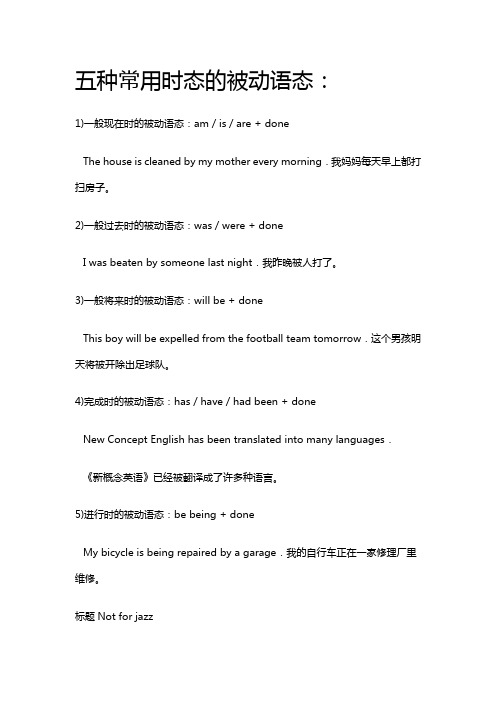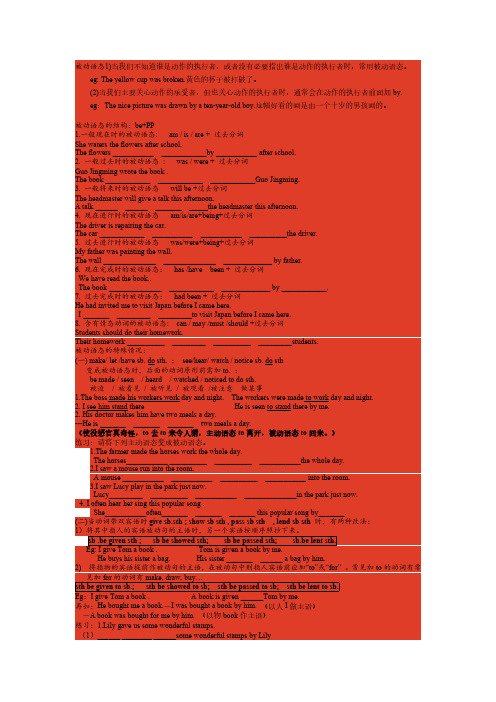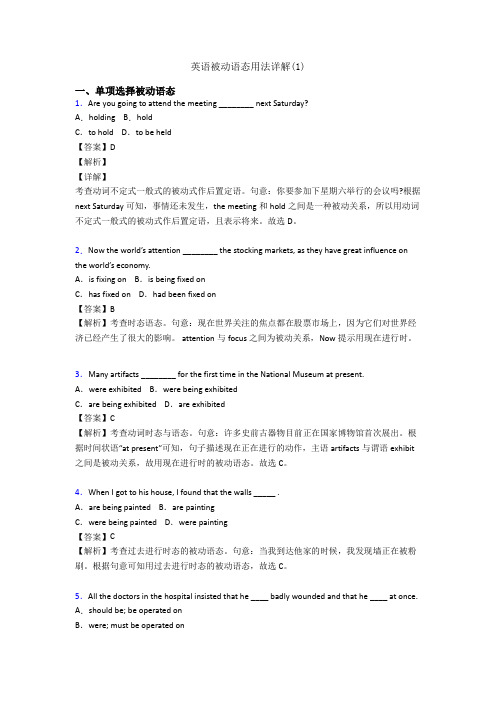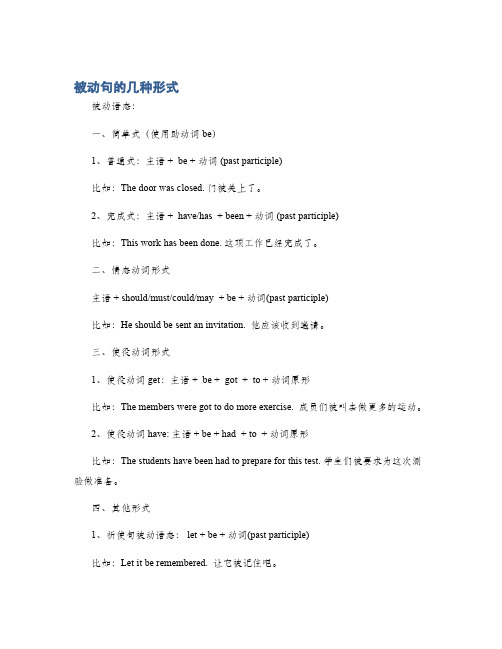被动语态1
英语专题汇编英语动词被动语态(一)含解析

英语专题汇编英语动词被动语态(一)含解析一、动词被动语态1. ________of the relaxing time for Chinese people every day ________in watching TV.A. Two thirds; are spentB. Two thirds; is spentC. Two third; are spentD. Two third; is spent【答案】 B【解析】【分析】句意为:中国人每天有2/3的休闲时间花在看电视上。
英语中分数的表达为:分子用基数词,分母用序数词,当分子大于1时,序数词应加s。
由于本句主语是“time(时间)”,是动作的承受者,应用被动语态,故选B。
【点评】考查序数词及被动语态。
2.Some people think trees____ on Tree Planting Day only.A. should plantB. should be plantedC. should be plantD. should be planting【答案】 B【解析】【分析】句意:一些人们认为种树应该只在植树节。
其中trees和plant是被动关系,且句中有情态动词should,则此处应用含情态动词的被动语态should be done,故选B。
【点评】此题考查被动语态。
注意含有情态动词的被动语态的结构。
3.Over $30,000 ______ for a children's hospital by a British girl several months ago.A. is raisedB. was raisedC. will be raisedD. has been raised【答案】B【解析】【分析】句意:几个月以前,一个英国女孩为一所儿童医院筹集了三万多美元。
ago 多久以前,过去的时间,根据several months ago可知用一般过去时态;主语和谓语动词之间是动宾关系,所以用被动语态。
中考英语之被动语态1

第十讲被动语态1一、构成:be+过去分词英语中有两种语态,主动语态:表示主语是谓语动作的执行者被动语态:表示主语是谓语动作的承受者1、被动语态各种时态形式2、情态动词的被动语态一般式:情态动词(can could may ,might,must,should,need等)+be+过去分词完成式:情态动词(can could may ,might,must,should,need等)+have+过去分词3、be going to 等不定式结构的被动形式Be going toOught toBe toBe bound toBe sure to +be+ 过去分词Be certain toBe due toBe about toHad to二、被动语态使用要点1、不及物动词不能用于被动语态Appear, rise , die ,happen , occur , lie , depart ,belong to ,breakout ,take place 等都属此类动词2、表示状态的动词不能用于被动语态英语中有些动词(短语动词)不是表示动作,而是表示某种状态或情况,有“拥有、容纳、适合、缺少、明白等意,这类动词不能用于被动语态,常见的有:lack ,fit,mean,hold,have,3、某些动词的进行时也可表示被动意义常见的这类词有:bake,owe,brew,cook,print,bind,do等。
例如:The meat is cooking .4、不及物动词构成的短语动词能否用于被动语态1)及物动词构成的短语动词总是及物性的,故可以用于被动语态注意:不可省掉或漏掉介词或副词。
如:ask for2)不及物动词构成的及物性短语动词则可以用于被动语态3)Rain 等不及物动词,有时也转用作及物动词。
5、主动形式表示被动意义的词1)某些感官动词和系动词加形容词可以表示被动意义。
如:look ,smell,taste。
五种常用时态的被动语态

五种常用时态的被动语态:1)一般现在时的被动语态:am/is/are + doneThe house is cleaned by my mother every morning.我妈妈每天早上都打扫房子。
2)一般过去时的被动语态:was/were + doneI was beaten by someone last night.我昨晚被人打了。
3)一般将来时的被动语态:will be + doneThis boy will be expelled from the football team tomorrow.这个男孩明天将被开除出足球队。
4)完成时的被动语态:has/have/had been + doneNew Concept English has been translated into many languages.《新概念英语》已经被翻译成了许多种语言。
5)进行时的被动语态:be being + doneMy bicycle is being repaired by a garage.我的自行车正在一家修理厂里维修。
标题Not for jazz总结for的用法:1)为:I bought a book for you.我为你买了一本书。
2)因为:Something fell in,for I heard a splash.一定有东西掉下去了,因为我听见扑通一声。
4)适合:Not for jazz=It's not suitable to play jazz on the clavichord.古钢琴不适合演奏爵士乐。
Question:What happened to the clavichord?to后面加宾语,表示其身上发生了什么事,即动作的目标、对象。
What happened to you?你怎么了?(在你身上发生了什么事?)(1)否定句与疑问句的被动语态We don’t believe her.我们不信她的话。
被动语态1

A.to sayB.saidC.sayingD.having said12.——______that the sports meet might be put off.——Yes,it all depends on the weather.A.I´ve been toldB.I´ve toldC.I´m toldD.I told13.A library with five thousand books______to the nation as a gift.(NMET)A.is offeredB.has offeredC.are offeredD.have offered14.Betty has never been heard_______ill of others.A.speakB.spokenC.to speakD.was said15.Tom______to have delivered the speech in their theatre room.A.saidB.saysC.is saidD.was said16.——What do you think of the book?——Oh,excellent.It´s worth______a second time.(NMET)A.to readB.to be readC.readingD.being read17.Little Jim should love______to the theatre this evening.(NMET)A.to be takenB.to takeC.being takenD.taking.18.______more attention,the trees could have grown better.(NMET)A.GivenB.to giveC.GivingD.Having given19.——where______the book?I can’t see it anywhere.——I______it right here but now it’s gone.A.did you put;have putB.have you put;putC.had you put;was puttingD.were you putting;have put20.He would not fail so long as he______hard the next term.A.studiedB.would studyC.had studiedD.studies21.How long______the English party______?A.has;been lastedB.did;lastC.was;lastedD.will;be lasted22.What______you______this time next Friday?A.will;doB.have;been doingC.are;doingD.will;be doing23.Hardly______the bell______when the teacher came in.A.did;ringB.would;ringC.has;rungD.had;rung24.It______and the streets were still wet.A.had been rainingB.rainedC.had been rainedD.would rain25.The book____on the ground for ten minutes but no noe has picked it up.A.is lyingB.has lainyD.has been lying26.We______there when it______to rain.A.were getting;would beginB.were about to get;beganC.had got;had begunD.would get;began27.The teacher said we______ten lessons by the end of this term.A.should have studiedB.were going to studyC.have studiedD.should study28.——she told me she had met you in London last year.——______you______her since?A.Had;metB.Did;seeC.Would;meetD.Have;seen29.——When______again?——When he______,I’ll let you know.A.will he come;will comeB.will he come;comeC.he comes;comesD.will he come;comes30.Tom______for more than a week.A.has leftB.had gone awayC.went awayD.has been away31.——What happened to her teeth?——She______the apple more than she could chew.A.has bittenB.bitC.had been bittingD.bites32.Shakespeare was said______37famous plays in his lifetime.A.finishing writingB.to finish writingC.having writtenD.to have written33.——You’ve agreed to go.So why aren’t you getting ready?——But I______that you______me to start at once.A.don’t realize;wantB.don’t realize;wantC.haven’t realized;wantD.didn’t realize;wanted34.——I missed the lecture last night.——Oh,what a pity!I wish______.A.you heared itB.you had heard itC.you never heard itD.you hadn’t heard it35.I’ll return the book to the library as soon as I______it.A.finishedB.am going to finishC.will finishD.have finished36.——Your phone number again?I______quite catch it.——It’s9586442.(NMET)A.didn’tB.couldn’tC.don’tD.can’t37.——I’m sorry to keep you waiting.——Oh,not at all.I______here only a few minutes.A.have beenB.had beenC.wasD.will be38.When I was at college.I______three foreign languages,but I______all except a few words of each.A.spoke;had forgottenB.spoke;have forgottenC.had spoedn;had forgottenD.had spoken;have forgotten39.The new secretary is supposed to report to the manager as soon as she______.A.will arriveB.arrivesC.is going to arriveD.is arriving (NMET)40.——Who is Jerry Cooper?——______?I saw you shaking hands with him at the meeting.(NMET)A.Don’t you meet him yetB.Hadn’t you met him yetC.Didn’t you meet him yetD.Haven’t you met him yet41.——We could have walked to the station.It was so near.——Yes,a taxi______at all necessary.(NMET)A.wasn’tB.hadn’t beenC.wouldn’t beD.won’t be42.We haven’t heard from Jane for a long time.What do you suppose______to her?(NEMT)A.was happeningB.to happenC.has haqqendD.having happened43.On Saturday afternoon,Mrs Green went to the market,______some bananas and visited her cousin.(NMET)A.bought B.buying C.to buy D.buy44.As she______the newspaper,Granny______asleep.(NMET)A.read;was fallingB.was reading;fellC.was reading;was fallingD.read;fell45.I______the bad cold for a week,still I can’t get rid of it.A.caughtB.have caughtC.haveD.have had46.I______the time______so quickly.A.didn’t realize;had passedB.don’t realize;passedC.haven’t realized;passedD.hadn’t realized;had passed47.——My watch______twelve o’clock.It’s so late.——Let’s hurry up.A.is saidB.saysC.is toldD.tells48.Helen______her key in the office so she had to wait her husband_____home.(NMET)A.has left;comesB.left;had comeC.had left;cameD.had left;would come49.The pen I______I______is on my desk,right under my nose.(NMET)A.think;lostB.thought;had lostC.think;had lostD.thought;have lost50.——Jane has just arrived.——I didn’t know she______.A.is comingB.was comingC.had been comingD.willcome答案1-5C A D D C6-10B B C A D11-15B A A C C16-20C A A B A21-25B D D A D26-30B A D D D31-35B D D B D36-40A A B B D41-45A C A B D46-50A B C B B。
英语被动语态用法详解(1)

英语被动语态用法详解(1)一、单项选择被动语态1.Are you going to attend the meeting ________ next Saturday?A.holding B.holdC.to hold D.to be held【答案】D【解析】【详解】考查动词不定式一般式的被动式作后置定语。
句意:你要参加下星期六举行的会议吗?根据next Saturday可知,事情还未发生,the meeting和hold之间是一种被动关系,所以用动词不定式一般式的被动式作后置定语,且表示将来。
故选D。
2.Now the world’s attention ________ the stocking markets, as they have great influence on the world’s economy.A.is fixing on B.is being fixed onC.has fixed on D.had been fixed on【答案】B【解析】考查时态语态。
句意:现在世界关注的焦点都在股票市场上,因为它们对世界经济已经产生了很大的影响。
attention与focus之间为被动关系,Now提示用现在进行时。
3.Many artifacts ________ for the first time in the National Museum at present.A.were exhibited B.were being exhibitedC.are being exhibited D.are exhibited【答案】C【解析】考查动词时态与语态。
句意:许多史前古器物目前正在国家博物馆首次展出。
根据时间状语“at present”可知,句子描述现在正在进行的动作,主语artifacts与谓语exhibit 之间是被动关系,故用现在进行时的被动语态。
故选C。
4.When I got to his house, I found that the walls _____ .A.are being painted B.are paintingC.were being painted D.were painting【答案】C【解析】考查过去进行时态的被动语态。
被动语态讲解(1)主动句变为被动句所遵循的4个步骤:

被动语态讲解(1)主动句变为被动句所遵循的4个步骤:初中被动语态语法讲解主动句变为被动句所遵循的4个步骤:1、把原主动句中的宾语变为被动句的主语2、把动词变为被动形式即be +过去分词,并注意其人称和数随主语的变化,而动词的时态则保持不变。
3、原主动句的主语如需要则放在by后面以它的宾格形式出现(注代词的宾格),如不需要则可省略。
4、其它的成分(定语、状语)不变。
(一) 语态分类英语动词有两种语态.,主动语态和被动语态。
主动语态表示主语是动作的执行者,被动语态表示主语是动作的承受者。
如:They will build a new bridge over the river. (主动)A new bridge will be built over the river. (被动)汉语中常用“被”、“给”、“由”、“受”等词用来表示被动,而英语用:助动词be + 及物动词的过去分词构成。
(二) 被动语态的时态、人称和数的变化主要体现在be的变化上,其形式与系动词be的变化形式完全一样。
一般现在时:am / is / are + done一般过去时:was / were + done一般将来时:shall / will + be done一般过去将来时:should / would + be done现在进行时:am / is / are + being + done过去进行时:was / were + being + done现在完成时:have / has + been + done过去完成时:had + been + done将来完成时:shall / will + have been + done过去将来完成时:should / would + have been + done[注]被动语态没有将来进行时和过去将来进行时。
(三)常见的八种时态中的被动语态1. 一般现在时:(1)People grow rice in the south of the country.Rice is grown in the south of the country.(2)The school doesn't allow us to enter the chemistry lab without a teacher. We are not allowed to enter the chemistry lab without a teacher.2. 一般过去时:(1)They agreed on the building of a new car factory last month.The building of a new car factory was agreed on last month.(2)The students didn't forget his lessons easily.His lessons were not easily forgotten3. 一般将来时:(1)They will send cars abroad by sea.Cars will be sent abroad by sea.(2)They will give plenty of jobs to school-leavers.Plenty of jobs will be given to school-leavers.4. 过去将来时:(1)The manager said they would complete the project by the end of the year. The manager said the project would be completed by the end of the year. (2) The workers told me they would mend the car as soon as possible.The workers told me that the car would be mended as soon as possible.5. 现在进行时:(1)The radio is broadcasting English lessons.English lessons are being broadcasted on the radio.(2) We are painting the rooms.The rooms are being painted.6. 过去进行时:(1)The workers were mending the road.The road was being mended.(2)This time last year we were planting trees here.Trees were being planted here this time last year.7. 现在完成时:(1)Someone has told me the sports meeting might be put off.I have been told the sports meeting might be put off.(2)He has brought his book here.His book has been brought here.8. 过去完成时:(1)When I got to the theatre, I found they had already sold out the tickets.When I got to the theatre, I found the tickets had already been sold out.(2) The whole country was very sad at the news of his death; People had considered him to be a great leader.He had been considered to be a great leader(四)含有情态动词的被动语态:含有情态动词的被动语态是由“情态动词+ be+ 及物动词的过去分词”构成。
被动句的几种形式

被动句的几种形式被动语态:一、简单式(使用助动词be)1、普通式:主语 + be + 动词 (past participle)比如:The door was closed. 门被关上了。
2、完成式:主语 + have/has + been + 动词 (past participle)比如:This work has been done. 这项工作已经完成了。
二、情态动词形式主语 + should/must/could/may + be + 动词(past participle)比如:He should be sent an invitation. 他应该收到邀请。
三、使役动词形式1、使役动词 get:主语 + be + got + to + 动词原形比如:The members were got to do more exercise. 成员们被叫去做更多的运动。
2、使役动词 have: 主语 + be + had + to + 动词原形比如:The students have been had to prepare for this test. 学生们被要求为这次测验做准备。
四、其他形式1、祈使句被动语态: let + be + 动词(past participle)比如:Let it be remembered. 让它被记住吧。
2、there+ be 结构:there + be + 主语 + 动词(past participle)比如:There was an earthquake yesterday. 昨天发生了一次地震。
3、it 作形式主语+be+done: it + be + done + that + 句子比如:It is said that the environment is being seriously polluted. 据说环境受到严重污染。
随着社会的发展,被动语态功能的使用越来越普遍,它不仅可以强调动作本身,也可以强调说话者关注的对象。
被动语态(1)

7. Did you plant many trees at this time last year? Were ______ _______ _______ many trees planted _______
at this time last time?
8.Must we finish our work today?
13.You must take this medicine three times a day. must be This medicine _______ _______ taken ________ three times a day.
14.The students in this school study German. is studied German _______ ________ by the students in this school. 15.Do they often talk about this question?
被动语态使用方法:
当我们不知道谁是动作的执行者, 或者没有必要指出谁是动作的执行 者时,或者只需强调动作的承受者 时,要用被动语态。
肯定句,否定句及疑问句如下。
Cars are made in Changchun. Cars are not made in Changchun. ---Are cars made in Changchun? (---Yes, they are./No,they aren’t.) Where are cars made?
The windows were broken by him.
一般现在时: am / is / are done 一般过去时: was / were done 现在进行时: am / is / are being done 过去进行时: was / were being done 现在完成时: have / has been done 过去完成时: had been done 一般将来时: shall / will be done ; be going to be done 当句中含有情态动词时,句子结构为 can / must / have to…be done
- 1、下载文档前请自行甄别文档内容的完整性,平台不提供额外的编辑、内容补充、找答案等附加服务。
- 2、"仅部分预览"的文档,不可在线预览部分如存在完整性等问题,可反馈申请退款(可完整预览的文档不适用该条件!)。
- 3、如文档侵犯您的权益,请联系客服反馈,我们会尽快为您处理(人工客服工作时间:9:00-18:30)。
He plants flowers every year.
--> Flowers are planted by him every year.
We speak Chinese.
--> Chinese is spoken by us.
I look after the old man.
--> The old man is looked after by me.
Do you clean your room every day?
--> Is your room cleaned by you every day?
Tom doesn’t wash his shoes every week.
--> Tom's shoes aren't washed by him every week.
I wrote a letter yesterday.
--> A letter was written by me yesterday.
Mary made 3 kites the other day.
--> 3 kites were made by Mary the other day.
Did they build this bridge last year?
--> Was this bridge built by them last year?
They asked us to sing a song.
--> We were asked to sing a song by them.
They didn’t water the flowers.
--> The flowers weren't watered by them.
We must obey the school rules.
--> The school rules must be obeyed by us.
Should I open the door?
--> Should the door be opened by me?
Wu must plant trees every year.
--> Trees must be planted by us every year.
Tom shouldn’t drink cold water.
--> Cold water shouldn't be drunk by Tom.
We can’t see s tars in the day time.
--> Stars can't be seen by us in the day time.
Mary will sweep the floor.
--> The floor will be swept by Mary.
Will Tom clean his room?
--> Will Tom's room be cleaned by him?
I won’t believe his story.
--> His story won't be believed by me.
People won’t use paper money in 100 years.
--> Paper money won't be used by people in 100 years. Mary is going to wash the dishes.
--> The dishes are going to be washed by Mary.
Tom has cleaned his room.
--> Tom's room has been cleaned by him.
They have planted a lot of trees since 1990.
--> A lot of trees have been planted by them since 1990.
Mary hasn’t cleaned her room.
--> Mary's room hasn't been cleaned by her.
Have you finished your homework?
--> Has your homework been finished by you?
How many books have you sold out so far?
--> How many books have been sold out by you so far?
A friend is playing the piano.
--> The piano is being played by a freind.
They are reading some old books.
--> Some old books are being read by them.
Are you using your knife?
--> Is your knife being used by you?
Tom is not reading a book.
--> A book is not being read by Tom.
Is Mary serving you now?
--> Are you being served by Mary now?
I was mending the bike when Tom came in.
--> The bike was being mended by me when Tom came in.
They were handing out the exercise books when the teacher came in .
--> The exercise books were being handed out by them when the teacher came in. He gave me a book yesterday.
--> A book was given to me by him yesterday
或
--> I was given a book by him yesterday.
His mother bought him a new coat.
--> He was bought a new coat by his mother.
或
--> A new coat was bought for him by his mother.
They heard her sing a song at the party.
-> She was heard to sing a song at the party.
I found him playing in the park.
--> He was found playing in the park(by me).
The teacher made Tom stand for a long time.
--> Tom was made to stand for a long time by the teacher.
We can take good care of your cat.
--> Your cat can be taken good care of by us.。
